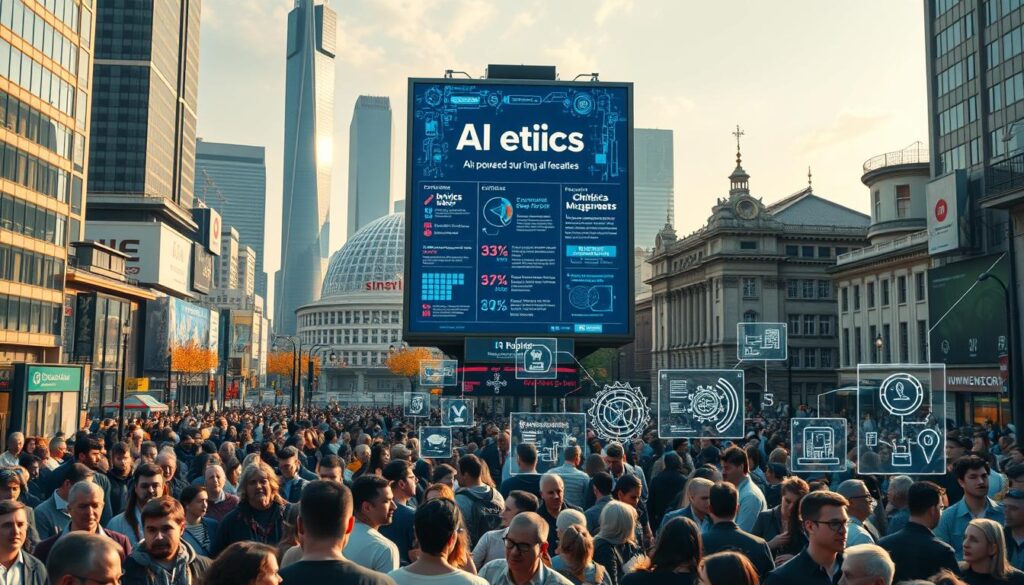By 2025, AI is expected to automate nearly 85 million jobs globally. As artificial intelligence becomes more integral to our lives, grasping its ethical aspects is vital. AI ethics explores the moral and societal implications of AI, ensuring its development and use are ethical.
As our reliance on AI grows, ethical issues like bias, privacy, transparency, and accountability emerge. These are central to the question of What Is AI ethics? It is imperative to establish guidelines and principles for AI development. This guide will introduce you to the basics, significance, and principles of AI ethics. It aims to equip you with the knowledge to engage with AI technologies ethically.
Key Takeaways
- AI ethics focuses on the moral implications and societal impacts of artificial intelligence.
- Responsible AI development is a necessity in today’s rapidly advancing technological landscape.
- Main ethical concerns include bias, privacy, transparency, and accountability.
- Clear guidelines and principles are essential for ethical AI usage.
- This guide provides you with a thorough understanding of Artificial Intelligence principles.
Understanding AI Ethics and Its Importance
Artificial Intelligence (AI) ethics is a burgeoning field focused on ensuring AI technologies respect human values and societal norms. A deep understanding of AI ethics is crucial, as it underpins the creation of AI systems that are beneficial, equitable, and accountable. By adhering to ethical AI guidelines, potential risks are mitigated, and public trust in AI innovations is enhanced.
Definition of AI Ethics
AI ethics encompasses the moral principles and practices guiding AI technology development, deployment, and regulation. It involves considerations such as fairness, transparency, and respect for individual autonomy. By adhering to these ethical standards, developers and organizations can ensure AI systems positively contribute to society while minimizing harm.
Key Principles of AI Ethics
At the heart of AI ethics are several key principles that serve as a framework for responsible AI development. These principles include:
- Beneficence: AI systems should aim to generate benefits for individuals and society.
- Non-maleficence: Developers must take care to avoid causing harm through AI applications.
- Autonomy: AI should respect the decision-making capabilities and freedoms of users.
- Justice: AI systems should promote fairness and impartiality, ensuring equitable treatment of all individuals.
Beyond these core principles, the establishment of robust AI governance frameworks is essential. These frameworks provide structured approaches to implementing ethical standards and monitoring the AI societal impact. They ensure AI solutions align with overarching ethical goals.
Historical Context of AI Ethics
The evolution of artificial intelligence ethics began with the acknowledgment that technological progress necessitates a deeper understanding of its consequences. Pioneers in the field established foundational principles to harmonize innovation with prudence. This early work set the stage for ongoing discussions about the ethics of AI.
Early Development of AI Ethics
In its nascent stages, AI research was largely confined to theoretical debates within academic environments. These discussions centered on creating ethical AI guidelines to guide future applications responsibly. A pivotal moment was the creation of the Asilomar AI Principles in 2017. This initiative provided a comprehensive framework for the safe development of AI.
Significant Ethical Debates
As AI began to permeate various sectors, critical ethical debates arose. A primary concern was the AI workforce implications, with automation raising questions about employment and economic security. The issue of algorithmic bias also garnered significant attention, sparking intense discussions among technologists and ethicists. These debates highlighted the urgent need for stringent ethical AI guidelines to address the escalating concerns surrounding AI’s widespread impact.
Key Elements of AI Ethics
Understanding and addressing the key elements of AI ethics is crucial for the responsible deployment of artificial intelligence technologies. The foundational concerns such as AI fairness and bias, AI transparency and accountability, and AI privacy and security are integral to building public trust and ensuring ethical practices.
Fairness and Bias in AI
AI fairness and bias are pivotal issues that can significantly impact the effectiveness and acceptance of AI systems. Ensuring fairness means that AI systems should not systematically favor or disadvantage any group based on race, gender, or other protected characteristics. Addressing bias is essential since biased algorithms can perpetuate existing inequalities, leading to unfair outcomes in critical areas such as hiring, lending, and law enforcement.
Transparency and Accountability
AI transparency and accountability are equally critical in fostering trust. Transparent AI systems allow stakeholders to understand how decisions are made, which is essential for building trust with users and ensuring ethical usage. Accountability mechanisms are necessary to hold developers and organizations responsible for the implications of their AI systems and to prevent misuse.
Privacy Considerations
AI privacy and security are indispensable when dealing with sensitive personal data. Ensuring robust privacy measures protects individual data from unauthorized access and misuse. Maintaining high levels of security prevents data breaches, which can have severe ramifications for both individuals and organizations. Adherence to privacy guidelines demonstrates a commitment to safeguarding individuals’ rights and fostering trust in AI technologies.
The Role of AI in Society
The integration of artificial intelligence (AI) into various sectors marks a significant evolution in modern society. It transforms workplaces and revolutionizes decision-making processes, having a profound and multifaceted impact. Understanding AI’s societal role involves examining its influence on employment and critical decision-making.
AI’s Impact on Employment
One of the most debated aspects of AI’s presence in society is its effect on employment. The AI workforce implications are far-reaching, with automation potentially displacing certain job categories while simultaneously creating new opportunities in tech-centric fields. It’s crucial to consider how responsible AI development can mitigate unemployment risks by facilitating upskilling and reskilling initiatives.
Influence on Decision-Making
AI also plays a transformative role in decision-making across various industries such as healthcare, finance, and law enforcement. AI systems can analyze vast datasets to provide insights that humans might overlook, enhancing accuracy and efficiency. This power comes with the need for responsible AI development to ensure decisions are fair, unbiased, and transparent. For example, developing ethical guidelines can prevent discriminatory practices in automated decision-making systems.
In conclusion, the potential AI societal impact is immense, shaping future workplaces and influencing critical decisions. As society continues to embrace AI, it’s vital to pursue ethical and responsible advancement to maximize benefits while minimizing adverse outcomes. For further reading on unlocking the future with AI, you can explore this comprehensive resource.
Ethical Frameworks in AI Development
Incorporating ethical frameworks into AI development is critical for ensuring these technologies are used responsibly. By applying principles from various ethical theories, developers and policy-makers can create AI systems that align with societal values and ethical AI guidelines. Two prominent ethical frameworks are utilitarianism and deontological ethics, each offering unique perspectives on addressing AI-related moral dilemmas.
Utilitarianism and AI
Utilitarianism, founded by philosophers like Jeremy Bentham and John Stuart Mill, advocates for actions that promote the greatest good for the greatest number. In the context of AI development, this translates to creating systems that maximize overall benefits while minimizing harm. For instance, AI algorithms designed under utilitarian principles are evaluated based on their ability to produce positive outcomes for the majority. This approach aligns well with the implementation of AI governance frameworks that aim to enhance public welfare through technology.
Deontological Approaches
Contrastingly, deontological ethics, associated with philosopher Immanuel Kant, focuses on adherence to moral duties and rules regardless of the outcome. In AI development, a deontological approach emphasizes the importance of following ethical AI guidelines, ensuring that technologies operate within established moral boundaries. This means prioritizing transparency, fairness, and accountability, even if it doesn’t always lead to the most beneficial results. Deontologists argue that maintaining strict ethical standards is crucial for preserving human dignity and trust in AI systems.
By understanding and integrating these ethical frameworks, developers can better navigate the complex moral landscape of AI, creating technologies that not only advance innovation but also uphold ethical principles.
Regulatory and Legal Perspectives

As artificial intelligence advances, grasping regulatory and legal viewpoints becomes crucial. Current laws on AI ethics, alongside government roles, mold the AI governance framework. They ensure AI systems meet ethical standards and adhere to legal requirements.
Current Legislation on AI Ethics
Worldwide, numerous laws and regulations have been implemented to tackle AI’s ethical challenges. The European Union’s General Data Protection Regulation (GDPR) focuses on privacy and data protection, key to AI’s ethical compliance. In the United States, the Algorithmic Accountability Act seeks to evaluate automated decision-making systems. It aims to prevent biases and ensure fairness.
The Role of Government Bodies
Government agencies, such as the Federal Trade Commission (FTC) in the United States, are vital in enforcing AI legal aspects. They guarantee AI systems follow established standards and regulations, fostering transparency and accountability. Organizations like the Organization for Economic Co-operation and Development (OECD) also offer guidelines. These assist in the creation and application of AI governance frameworks worldwide.
To gain deeper insights into AI’s ethical and legal evolution, explore new perspectives on AI ethics and. This resource provides in-depth analyses and discussions. It highlights how legal frameworks adapt to technological progress.
Corporate Responsibility in AI
In today’s rapidly evolving technological landscape, corporations must navigate the complexities of AI ethics with a keen sense of responsibility. Responsible AI development requires meticulous planning and execution. It ensures that AI systems are not only efficient but also aligned with ethical standards.
Developing Ethical Guidelines
The cornerstone of corporate AI ethics lies in the development of robust ethical guidelines. Companies need to institute comprehensive policies that promote transparency, accountability, and fairness. An effective set of guidelines addresses issues like data privacy, algorithmic bias, and the broader implications of AI applications.
Adopting well-defined ethical AI guidelines ensures that AI technologies serve the greater good while mitigating potential harms.
Examples of Ethical AI Practices
Leading organizations have set benchmarks in ethical AI practices. For instance, Google’s AI Principles emphasize the importance of social benefit, avoiding bias, and ensuring data privacy. Microsoft’s AI ethics framework focuses on inclusive design and transparent operations.
These examples underscore the significance of integrating responsible AI development into core business strategies. By following these practices, companies not only comply with regulatory standards but also foster public trust and long-term sustainability.
Public Perception of AI Ethics

Understanding public perception of AI ethics is vital for AI’s integration and acceptance in society. Sentiment ranges from trust in AI systems to skepticism about their implications. This dichotomy is fundamental to AI’s societal role.
Trust and Skepticism in AI Technology
Trust in AI is shaped by personal experiences, media portrayals, and incidents of AI misuse. An individual’s trust level varies based on their belief in AI’s ethical development and deployment. This belief is a cornerstone of AI’s societal acceptance.
Skepticism arises when AI technologies cause harm, such as biases in decision-making or privacy breaches. This skepticism underscores the necessity for thorough AI ethical awareness. It ensures public trust and acceptance.
The Role of Media in Shaping Opinions
The media significantly influences AI public opinion. It disseminates information on AI’s benefits and risks through various platforms. By showcasing both successful applications and misuse incidents, the media shapes societal views. It advocates for responsible AI usage.
Future Challenges in AI Ethics
The rapid advancement of artificial intelligence heralds a new technological era, yet it introduces complex ethical dilemmas. These challenges are both profound and intricate, demanding careful consideration.
Evolving Technology and Ethical Dilemmas
As AI technologies progress, ethical challenges escalate in complexity. Privacy breaches, biases in algorithmic decision-making, and the misuse of AI for societal harm are pressing concerns. The establishment of Global AI ethical standards that align with technological advancements is imperative.
Global Perspectives on AI Ethics
The global impact of AI necessitates universal Global AI ethical standards. Countries vary in their views on ethical AI practices, leading to inconsistencies and conflicts. The creation of international bodies focused on AI ethics could harmonize these perspectives, offering unified guidelines. Engaging in dialogues that balance innovation with ethical responsibility is essential for the future of AI ethics.
Integrating these ethical frameworks is not straightforward. Addressing these AI ethical dilemmas is vital for AI’s responsible development. Through global cooperation and shared standards, we can successfully navigate these emerging challenges.
How You Can Contribute to Ethical AI Practices
The path to a more ethical artificial intelligence (AI) starts with your actions. By grasping the importance of ethical AI education and actively promoting AI ethics, you can significantly influence AI’s future. Here’s how you can contribute to this transformation.
Educating Yourself and Others
Initiating ethical AI practices begins with personal education. Explore resources from esteemed organizations like the AI Ethics Lab or the Partnership on AI. These include books, courses, and webinars that cover essential topics like fairness, transparency, privacy, and accountability. This knowledge empowers you to make informed choices and engage in significant discussions. Share your insights with colleagues, community groups, or through social media to enhance awareness of ethical AI usage.
Advocating for Responsible AI Usage
Education is just the beginning. Engage actively in promoting AI ethics within your reach. Support policies and regulations that uphold ethical AI standards. Encourage companies and developers to adopt transparent and accountable practices. Collaborate with initiatives and advocacy groups focused on AI ethics, such as the IEEE Global Initiative or the Center for Human-Compatible AI. Your support helps foster a culture that prioritizes ethical AI development.
Your efforts are crucial in shaping AI systems that are fair, transparent, and respect privacy. By dedicating yourself to ongoing learning and advocating for ethical AI, you are instrumental in creating a technologically advanced yet ethically sound future.

